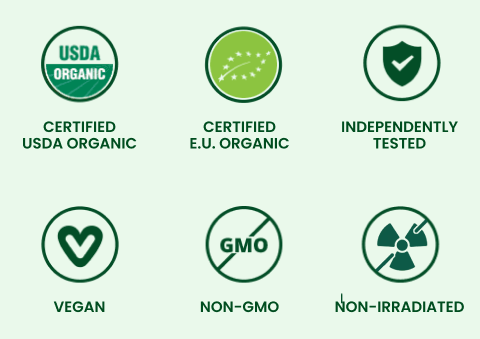If you suffer from allergies, there's no shortage of medications you can choose from. But are there natural alternatives that don't leave you feeling drowsy or listless? Maybe you need a break from all the nasal sprays and you want to try a natural remedy with no negative side effects.
Moringa may be the help you're looking for.
Moringa is one of nature's richest sources of anti-histamines and anti-inflammatories. Introducing moringa to your diet is a healthy way to minimize the effects of Asthma and Allergies.
Some people have managed their asthma with Moringa alone, while others use it as a complement to drugs or other natural supplements like Butterbur. Read on to see if moringa can help you.
Moringa Oleifera for Asthma
Aside from being a potent ant-inflammatory, Moringa seed kernels posses amazing anti-asthma properties.
There have been 2 scientific studies which showed Moringa seed extract to be as effective at treating asthma as the prescription pharmaceutical drug Ketotifen, and without any of the negative side-effects.
The study, titled, “Investigation into the mechanism of action of Moringa Oleifera for its anti-asthmatic activity” concluded that Moringa has 4 important anti-asthma benefits:
- Broncodilator: Moringa dilates the bronchi and bronchioles, increasing airflow to the lungs by decreasing resistance in the respiratory airway.
- Mast Cell Stabilization: Moringa helps control allergic disorders by blocking the release of histamine.
- Anti-Inflammatory: Moringa possesses potent anti-inflammatory activity, comparable to that of pharmaceutical drug “Diclofenac Sodium” also known as “Nonsteroidal anti-inflammatory drugs”, but again without any of the potentially severe negative side effects.
- Anti-Microbial: Symptoms of breathlessness are sometimes signs of bronchial infection. Moringa Oleifera possesses potent anti-microbial activity when tested against various respiratory pathogens.

Although Moringa seed extract was used for this study, it was noted that a extract of Moringa leaves should posses many of the same benefits.
The study also points out that a hot water extract of moringa did not produce any of the positive effects. This means whatever phytonutrients or plant chemicals responsible for the anti-asthma benefits of Moringa are destroyed by high heat (so Moringa Tea would likely not be effective)
Moringa Oleifera for Allergies
Allergies affect approximately 50 million people in the United States and that number is sky-rocketing.
Americans spend roughly $4.5 Billion dollars a year on anti-histamine medications to treat allergy symptoms.
Side-effects of these Anti-histamine drugs include dry mouth, sleepiness, dizziness, nausea, vomiting, restlessness or moodiness and blurred vision.
New research suggests there are completely natural solutions that can ease your symptoms. By incorporating natural antihistamines in to your diet, you can manage your allergies and avoid the negative side effects of medications.
Moringa is loaded with antihistamine polyphenols, flavonoids, and antioxidants and it even contains Omega-3; a potent anti-inflammatory.
The Top 3 recommended natural Antihistamine’s are all found in abundance in Moringa.
Quercetin & Keampferol
These are two incredibly powerful antioxidants that work synergistically. Quercetin has been studied extensively for it’s antihistamine use.
“Quercetin is sort of the herbal equivalent to cromolyn sodium (in the over-the-counter spray NasalCrom),” Dr. Rakel tells WebMD “The evidence is promising.”
In the US, Quercetin is usually only highly available in Grapefruit, Onions and Okra, but Moringa Oleifera contains 5 times more Quercetin than any of these (1362.6 mg/kg).
By consuming Moringa (in powder or fresh form) you are getting both Quercetin and Kaempferol flavonoids. These two flavonoids have been shown to work together to fight everything from Cancer cells to inflammation.
Vitamin C
A 1992 study found that 2g of Vitamin C decreased histamine levels by 40 percent! Vitamin C actually destroys the molecular structure of histamine so it is recommended that you take a minimum of 500mg every day to fight off allergies/histamine.
Fresh Moringa contains 7 times more Vitamin C than Oranges. Through our low-temp controlled drying process, our Moringa supplements retain more of their Vitamin C than any other Moringa supplements on the market.
Omega 3
Omega 3, which acts as a anti-inflammatory can help protect you from allergic reactions.
According to Mother Earth News, a German study published in the journal Allergy found people who have diets rich in of omega-3 fatty acids suffer from fewer allergy symptoms.
A second study in Sweden found that children who regularly ate fish prior to age one had much lower allergies by age four.
Moringa is one of the few plant sources of Omega 3s in the world. Supplementing Moringa Powder is a great way to get Omega 3 for people who don’t like to eat fish.
Moringinine (like Sulforaphane, but better)
We saved the best for last. Perhaps the secret to everyone's success managing asthma with Moringa is the unique compound in Moringa called Moringinine. Moringinine is a recently discovered "active ingredient" in Moringa that researchers believe is the key to its use in Ayurverdic Medicine as a "cure for over 300 diseases".
Moringinine is very similar to sulforaphane found in Broccoli Sprouts (more on this below), but it turns out Moringa Isothiocyanates are better because they stable (sulforaphane needs to be stored at -20°C) and studies have shown them to have equal or stronger biological activity and absorption.
How does this help with Asthma?
A recent human study with 65 volunteers out of UCLA showed that sulforaphane, a chemical in broccoli sprouts, triggers an increase of antioxidant enzymes in the human nasal airway that offers protection against the onslaught of free radicals (air pollution, pollen, diesel exhaust and tobacco smoke)
"We found a two- to three-fold increase in antioxidant enzymes in the nasal airway cells" Riedl said.
"A major advantage of sulforaphane is that it appears to increase a broad array of antioxidant enzymes, which may help the compound's effectiveness in blocking the harmful effects of air pollution," Riedl said
"Sulforaphane may offer protection against inflammatory processes and could lead to potential treatments for a variety of respiratory conditions."
The major disadvantage with Sulforaphane is that the only good source of it is from fresh broccoli sprouts and keeping those on hand can be difficult. The problem is that sulforaphane is very unstable and creating a reliable supplement has proven to be nearly impossible (there are some very expensive exceptions).
But That's why scientist are so excited about Moringa's Isothiocyanate, Moringinine. It works just as well, if not better than sulforaphane, but remains stable over a long period of time -- making it suitable as a supplement.
[caption id="attachment_209" align="alignnone" width="696"] Moringinine isolated from blended Moringa leaves remained stable even after 30 days of being stored at 37°C (98.6°F)![/caption]
Moringinine isolated from blended Moringa leaves remained stable even after 30 days of being stored at 37°C (98.6°F)![/caption]
Don't be surprised when you hear about Moringinine in 2019-2020 as more studies are published, but you don't have to wait to start taking advantage of it's benefits.
Given the vast amount of health benefits the nutrition from Moringa offers, we think anyone who is also suffering from asthma or allergies should definitely give Moringa a try.
How Moringa Supports Your Immune System
Moringa powder isn't just beneficial for asthma and allergies; it also plays a crucial role in boosting your overall immune system. Packed with vitamins A, C, and E, moringa helps your body fight off free radicals, which can weaken immunity over time. The antioxidants found in moringa help strengthen the body's defense mechanisms, making it easier to fend off common illnesses like the cold and flu, which can aggravate asthma symptoms.
For more insights on how moringa benefits breastfeeding mothers, check out our detailed blog on Moringa for Breastfeeding Mothers: Increase Breast Milk with Moringa.
Moringa's Role in Reducing Inflammation
Chronic inflammation is often a root cause of respiratory issues, including asthma. Moringa extract contains powerful anti-inflammatory compounds such as isothiocyanates, which help reduce inflammation throughout the body, including in the airways. This not only alleviates asthma symptoms but also reduces overall inflammation, potentially lowering the risk of chronic diseases like heart disease or arthritis. If you’re looking for a natural solution to chronic inflammation, incorporating moringa capsules into your daily routine could be highly beneficial.
Interested in how moringa supports eye health? Read more in our blog Moringa for Eye Health: Studies Show Moringa Fights Cataract Development.
How Moringa Can Be Consumed for Maximum Effect
Moringa comes in various forms—powder, capsules, and even oil—each offering unique benefits. Moringa powder can be easily added to smoothies, soups, or teas for daily consumption, while moringa oil can be used topically to soothe inflamed skin. Moringa capsules are a convenient option for those who prefer a no-fuss supplement. For those dealing with asthma or allergies, it’s essential to maintain consistency in consumption to experience the full spectrum of benefits.
If you're looking for other ways moringa can benefit your health, especially related to magnesium deficiency, don't miss our article Moringa for Magnesium Deficiency: As Seen on Dr. Oz.
Combining Moringa with Other Natural Remedies
In addition to moringa extract, consider pairing it with other natural anti-inflammatory and antihistamine remedies like Quercetin and Omega-3 supplements. Together, these can provide a synergistic effect, maximizing the overall relief from asthma and allergy symptoms. If you are prone to seasonal allergies, consuming moringa oil along with Omega-3 supplements can provide a comprehensive natural solution, reducing both inflammation and allergic reactions.
To understand how moringa can help in preventing cognitive decline, read our blog on Moringa for Preventing Alzheimer's.


